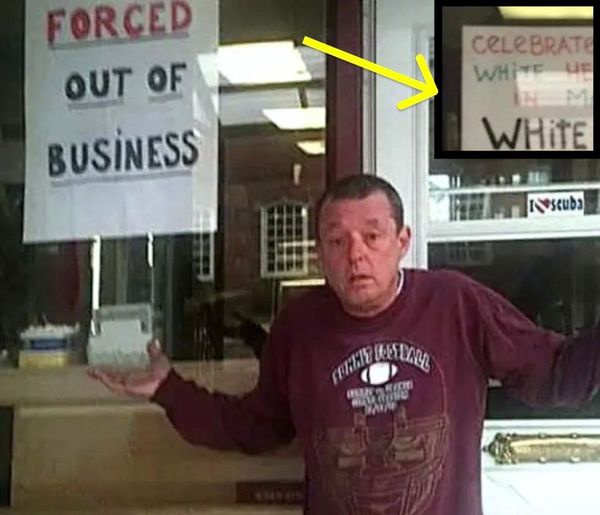Note: we are republishing this story which originally made the news in April 2015.
In Flemington, New Jersey, deli owner Jim Boggess sought a way to celebrate his heritage and share his pride with the community. Running a deli on Main Street, Boggess believed he had come up with an idea that would resonate with customers. He displayed a handwritten sign in his shop window that read: “CELEBRATE YOUR WHITE HERITAGE IN MARCH, WHITE HISTORY MONTH.”

What Boggess hoped would be a positive celebration of his background quickly spiraled into controversy. One customer, Bhakti Curtis, who is of mixed-race descent, found the sign offensive and troubling. Curtis claimed that it appeared to mock Black History Month and pointed out that the “T” in “WHITE” was crossed in a way reminiscent of symbols used by the Ku Klux Klan. Enraged, Curtis filed a complaint with the Flemington Police Department, expressing his concerns about the sign’s implications.
Although the police determined that the sign was neither racist nor explicitly derogatory, the public reaction was far less forgiving. The sign ignited a storm of backlash, with many in the community perceiving it as tone-deaf and offensive. For four days, Boggess faced mounting scrutiny and criticism. Feeling the pressure, he eventually removed the sign. However, the damage to his reputation and business had already been done.
The fallout was swift and severe. Long-time customers stopped coming to the deli, leaving Boggess struggling to keep his business afloat. Despite his efforts to make amends—including a public reconciliation with Curtis, where the two posed for a photograph shaking hands—the controversy continued to overshadow his deli. Just one month after putting up the sign, Boggess was forced to shut down his business entirely, unable to recover from the financial and reputational blow.
With his American dream slipping away, Boggess turned to the public for help. He launched a GoFundMe campaign titled “Jimbos white history sign gone bad,” hoping to rally support and share his side of the story. In the campaign description, Boggess expressed his frustration and defended his intentions:
“If you haven’t heard of this story and you want to read about it, just google Flemington white history or go on YouTube and search White History Month. Anyway, it went crazy for four days and then I had to take the sign down for various reasons. It was only supposed to be a white thing, but people read more into it than that.
I don’t think I deserve this just because I wanted to be proud of being white and be able to celebrate my heritage like everyone else does. If you read this, please leave a comment and what state you’re from so I can see where my support is coming from.
Thank you for all the support and I WILL stay strong and hope to find a job.
Thank you,
Jimbo Boggess.”
While Boggess received letters and messages of support from people across the country, it was not enough to bring back the customers he had lost. The controversy had permanently damaged his business, leaving him with no choice but to close its doors. For Boggess, the deli had been more than just a livelihood—it had represented his aspirations and his version of the American dream. Losing it was a deeply personal blow.
The story, originally reported in April 2015, continues to spark debates about free expression, cultural sensitivity, and the consequences of public perception. Boggess maintained that his intent was to celebrate his heritage in the same way other cultural groups celebrate theirs. However, critics argued that the execution of his idea was poorly thought out and failed to consider the broader social and historical context.
This incident underscores the challenges of discussing race and heritage in a diverse society. While some saw Boggess’s sign as an innocent expression of pride, others viewed it as an insensitive and provocative statement. The controversy serves as a reminder of the importance of considering how words and actions may be perceived by others, even if the intent behind them is not malicious.
For Jim Boggess, the fallout was a harsh lesson in the power of public opinion. His attempt to celebrate his heritage not only cost him his business but also highlighted the deeply ingrained sensitivities surrounding issues of race and identity in America. Despite the support he received from some corners of the country, the loss of his deli marked the end of a dream he had worked hard to build.
As the dust settled, Boggess’s story became a cautionary tale about the delicate balance between expressing personal pride and respecting the diverse perspectives of a broader community. It is a poignant example of how a single action, even with good intentions, can have unintended consequences that ripple far beyond what was ever anticipated.





